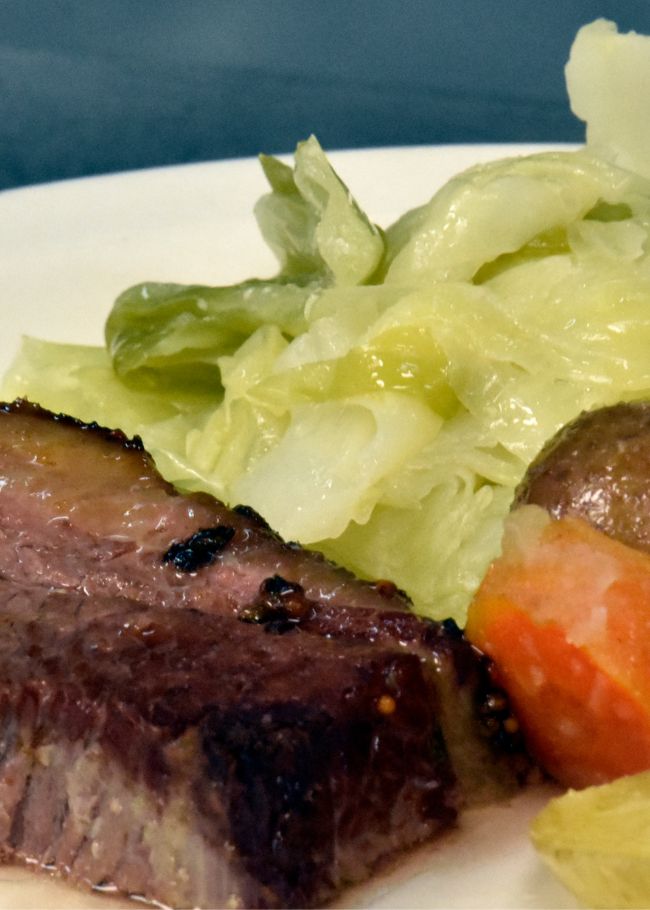How to Make Corned Beef and Cabbage: Boiled or Baked
Corned beef and cabbage are synonymous with St. Patrick’s Day and Irish cuisine. Whether you have Irish heritage or simply enjoy exploring different flavors, corned beef, and cabbage is a hearty and delicious meal that is sure to satisfy.

The origins of corned beef and cabbage can be traced back to Ireland, where it was traditionally made with salt-cured beef and hearty vegetables like cabbage, carrots, and potatoes. Today, there are many variations of this dish, but the most popular preparation methods are boiling and baking.
In this comprehensive guide, we will explore how to make corned beef and cabbage in two ways: boiled and baked. We will discuss the benefits of each method, provide step-by-step instructions, and offer some tips and tricks to make your dish even more delicious.
Boiled Corned Beef and Cabbage
Boiling corned beef and cabbage is a simple and traditional method that yields tender meat and flavorful vegetables. The benefits of boiling include simplicity, convenience, and the ability to infuse the beef and vegetables with the savory flavors of the cooking liquid.
To make boiled corned beef and cabbage, you will need the following ingredients:
- Corned beef brisket
- Cabbage
- Carrots
- Potatoes
- Onion
- Garlic
- Pickling spices
Here is a step-by-step guide on how to boil corned beef and cabbage:
Rinse the corned beef under cold water to remove any excess salt.
Place the corned beef in a large pot and cover with water.
Add the pickling spices that came with the corned beef, or make your own by combining spices like mustard seeds, coriander seeds, and peppercorns.
Bring the water to a boil, then reduce the heat to a simmer and cover the pot.
Cook the corned beef for about 3 hours until it reaches an internal temperature of 145°F for safety and 180°F for tenderness.
While the corned beef is cooking, prepare the vegetables by washing and cutting the cabbage into wedges, peeling and slicing the carrots, and scrubbing and chopping the potatoes.
After the corned beef has cooked for about 2 hours, add the vegetables to the pot and continue cooking until they are tender.
Remove the corned beef and vegetables from the pot and let them rest for a few minutes before slicing and serving.
To enhance the flavor of boiled corned beef and cabbage, you can try the following tips:
Baked Corned Beef and Cabbage
Baking corned beef and cabbage is an alternative method that offers a different texture and flavor profile. Baking allows the meat to become crispy on the outside while remaining tender and juicy on the inside. It also allows additional flavors to be added through spices, glazes, and sautéed vegetables.
To make baked corned beef and cabbage, you will need the following ingredients:
- Corned beef brisket
- Cabbage
- Carrots
- Potatoes
- Onion
- Garlic
- Spices (such as black pepper, thyme, or bay leaves)
- Honey mustard or brown sugar glaze (optional)
Here is a step-by-step guide on how to bake corned beef and cabbage:
Preheat your oven to 325°F.
Rinse the corned beef under cold water to remove any excess salt.
Place the corned beef on a large sheet of aluminum foil and season it with your choice of spices.
If desired, brush the corned beef with a honey mustard or brown sugar glaze.
Wrap the corned beef tightly in the foil and place it in a roasting pan.
Bake the corned beef for about 3 hours until it reaches an internal temperature of 145°F for safety and 180°F for tenderness.
While the corned beef is baking, prepare the vegetables by washing and cutting the cabbage into wedges, peeling and slicing the carrots, and scrubbing and chopping the potatoes.
In a separate pan, sauté the onion and garlic in butter until soft and fragrant. Add the cabbage and cook until it is wilted but still slightly crisp.
When the corned beef is done, remove it from the oven and let it rest for a few minutes before slicing.
Serve the sliced corned beef with the sautéed cabbage and roasted vegetables.
To enhance the flavor of baked corned beef and cabbage, you can try the following tips:
- Experiment with different spice blends to add depth and complexity to the meat.
- Brush the corned beef with a glaze made from honey mustard, brown sugar, and spices for a sweet and tangy flavor.
- Sauté the cabbage with onion and garlic adds flavor and dimension to the dish.
Conclusion
In conclusion, corned beef and cabbage is a classic dish that can be prepared in two different ways: boiled and baked. Both methods offer their own unique benefits in terms of flavor, texture, and convenience. Boiling the meat and vegetables results in a traditional and savory dish, while baking creates a crispy, tender, and flavorful meal. Whichever method you choose, corned beef and cabbage is sure to be a crowd-pleaser.
So why not give these recipes a try? Leave a comment below to let us know which method you prefer, or share your own tips and tricks for making corned beef and cabbage. And if you’re feeling adventurous, why not explore other variations of this dish, such as slow cooker corned beef and cabbage or instant pot corned beef and cabbage?






